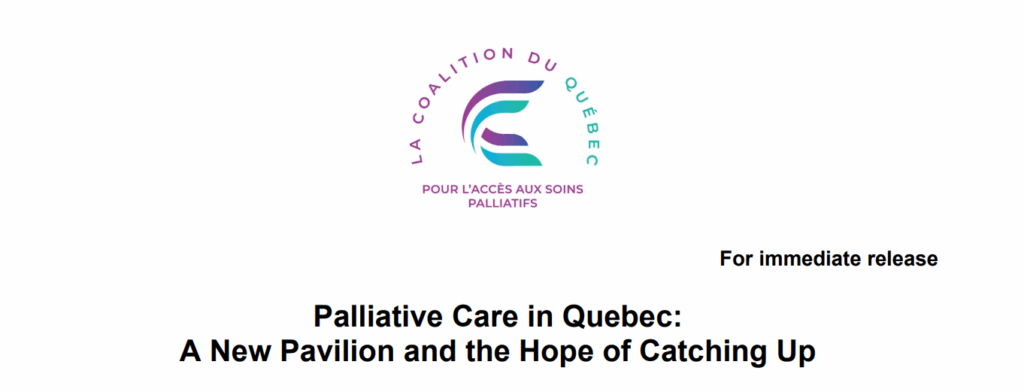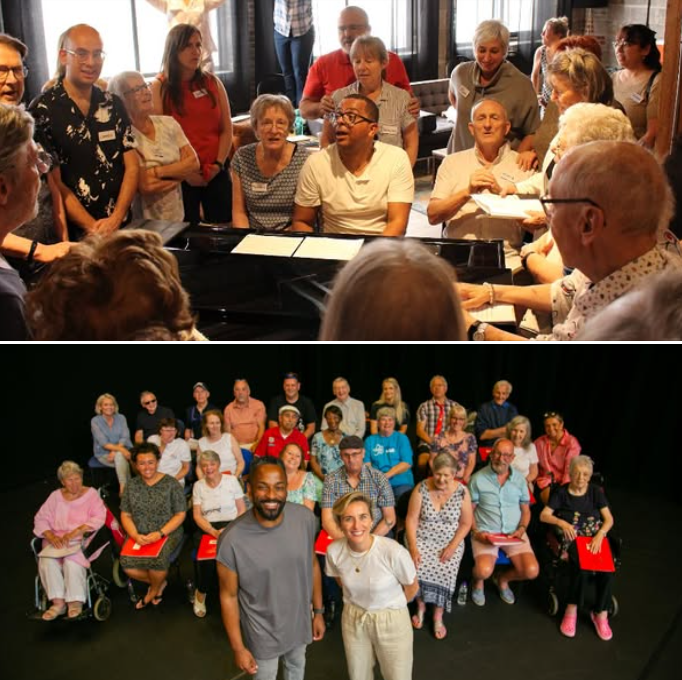Our First Newsletter of the Season
Dear allies,
The start of this new season has symbolic
significance for me: five years ago, I began actively collaborating with the
Living with Dignity citizen network, as its
coordinator. I am very happy to continue in this role on your behalf!
In this newsletter, we cover several topics,
including the Quebec adaptation of the BBC series “Our Dementia Choir.”
Choirs for people with Alzheimer’s or aphasia
already exist in Quebec (bravo to the SAM’Chante choirs!), and I hope that the new series
led by Gregory Charles will increase interest in them tenfold.
Have a great start to the school year!
Jasmin
Lemieux-Lefebvre
Coordinator
Living with Dignity citizen network
A new form of public-private partnership for a palliative and end-of-life care unit
A new “palliative and end-of-life care” unit will welcome its first patients in Lanaudière this month (official press release in French). “The new palliative care ward stands out for its model, in which the services and care provided will be managed by the public sector, in this case the CISSS de Lanaudière, but the building itself was financed by private partners,” explained Sonia Bélanger, Minister Responsible for Seniors, to Le Devoir last Thursday.
The Coalition for Access to Palliative Care in Quebec (of which we are a member) responded today with a press release.
Here is an excerpt:

“The Coalition for Access to Palliative Care in Quebec welcomes the government’s announcement of a new ten-bed palliative care pavilion in SaintCharles-Borromée. Any initiative that increases access to end-of-life care delivered with dignity, and any commitment by the Minister to advance palliative care, is a positive step and good news for the population. (…) The Coalition also hopes that this announcement will not come at the expense of essential support for existing resources and models — which are already enduring severe staff and funding
shortages — representing major barriers to accessing quality care. This is particularly true for private palliative care homes and certain home-based palliative care programs. More broadly, the absence of clear governance for palliative care within Santé Québec remains a source of concern. While Minister Sonia Bélanger has acknowledged that Quebec has “a lot of catching up to do,” this catch-up effort will not materialize without dedicated leadership and stable funding.”
It is unfortunate that the rest of the press coverage focuses on medical assistance in dying rather than palliative care (Journal
de Montréal, The Canadian Press, La Presse Canadienne – which corrected its article following our intervention, we thank its team).
We support the words of Dr. Justin Sander published in this CTV News article:
But Montreal-based palliative care doctor Justin Sanders says the emphasis should be put on palliative care designed to improve the lives of those with serious illnesses rather than MAID.
Quebec has one of the highest rates of MAID in the world, with assisted dying accounting for 7.3 per cent of all deaths in the province in 2023-2024. During that period, over 5,700 people received MAID in the province.
Sanders says medically assisted dying is not the only way to die with dignity and Quebec must keep investing in resources for those with serious illnesses.
“The promise of palliative care is not just that we can remove people’s suffering, but that we can give them experiences of transformational growth and integrity that can only come in this time,” he says.
“If we are investing more in medical aid in dying than we are in palliative care, then we will continue to have the kind of suffering that puts people in a position to ask for medical aid in dying,” he adds.
“Tous en chœur”, a new series inspired by “Our Dementia Choir”

The British series “Our Dementia Choir” will be
adapted this fall in Quebec under the name “Tous en chœur” (All Together). We
learned the news thanks to Nicole Poirier’s (LinkedIn) reaction to Isabelle Hachey’s (La Presse) article.
The original series, filmed in 2018 with a very
diverse group (aged 31 to 87!) of people living with various neurocognitive
disorders, is pure joy. We invite you to watch episode 1 https://vimeo.com/456342267 (a Vimeo account is all you need).
If you have a VPN, you can also watch the 2022
series via
the BBC.
The project’s initiator, actress Vicky McClure,
says:
“We won’t stop until everyone with this
disease gets the help they need. This isn’t just a disease that affects older
people; it’s the leading cause of death in the United Kingdom. Above all, I
want to make enough noise to bring about real change and make people who have
been diagnosed feel that they can still live their lives.”
We are delighted that Vicky McClure’s project
is now Gregory Charles’ project. Watch his interview with Sophie Fouron on ICI
Radio-Canada‘s Bonsoir Bonsoir program https://www.facebook.com/watch/?v=1341514667976279 (episode 71 of this season,
available on ICI tou.tv).
The series Our Dementia Choir with Vicky
McClure has become a charity with multiple initiatives (www.ourdementiachoir.com). We look forward to seeing the
development of its Quebec adaptation. To be continued this fall on
AMI-télé.
***
If you only want to see short, easily
accessible excerpts from the series Our Dementia Choir, here are some
suggestions:
BBC report with video excerpts
Betty, 82 / Eileen, 91 / The choir’s first performance, Stand by Me
Response to Le Devoir editorial “The quiet strength of social dialogue”
We regularly respond to articles, columns, and
editorials. Here is an example following the publication of this editorial by
Louise-Maude Rioux Soucy, published on August 23.
Through our coordinator, we shared these three
constructive observations:
a) MAID is no longer considered exceptional
care according to the Commission on End-of-Life Care:
“Although MAID remains, in most cases, a last
resort, it is no longer considered exceptional care but rather an option among
end-of-life care options” (p. 54 of the Report on the Situation of
End-of-Life Care in Quebec 2018-2023).
b) The Act respecting end-of-life care was not passed unanimously (94 in favor, 22 against)
https://assnat.qc.ca/fr/travaux-parlementaires/projets-loi/projet-loi-52-41-1.html
c) It seems to me that fears of slippery slopes were and still are justified. See:
– Episode 4 of the podcast La mort libre “The slippery slopes of MAiD”
– Unravelling MAiD in Canada, published by McGill-Queen’s
University Press
We are pleased to note that Le Devoir took the time to correct the text on August 29 (regarding point b). We are grateful to Ms. Soucy and her team.
To read, watch, or listen to
1) From Slippery Slope to Sheer Cliff: MAiD’s
Impact on Canada
60-minute webinar from the Cardus Institute, ahead of a report to be published on September 16.
2) Canada is killing itself
Feature article in The Atlantic magazine
3) Des microdoses de lithium pour freiner la progression de la maladie d’Alzheimer?
Microdoses of lithium to slow the progression of Alzheimer’s disease?
Web and video reports from Radio-Canada Sciences
4) Le combat de Will pour des soins à domicile / Will’s fight for home care
Report from Radio-Canada Côte-Nord
We support the Collectif Aidons William Losier
Labrie à rester à la maison (Let’s Help William Losier Labrie Stay at Home Collective).
5) Où en sommes-nous avec l’aide médicale à mourir 10 ans plus tard?
Where are we with medical assistance in dying
10 years later?
Podcast Idées en évolution / Questions d’actualité on Radio VM Interview with Philippe Labrecque and Dr. Catherine Ferrier, member of our board of directors.
SEP
2025
